The NHL version of the Cleveland Barons was one of the shortest-lived teams in the history of the league. The franchise was originally part of “The Great Expansion” of 1967 when the NHL expanded from six teams to an even dozen. Initially known as the Oakland Seals from 1967 until 1970, the Bay Area team eventually changed their name to the California Golden Seals (shortening it to just the Seals for their final two seasons of 1974-75 and 1975-76).
The Seals were financially strapped, and with a cancellation of plans to build a new arena in San Francisco, minority owner George Gund III persuaded majority owner Melvin Swig to move the team to his hometown of Cleveland for the 1976–77 NHL season. As a means of honoring the city’s former American Hockey League (AHL) club that had played in Cleveland from 1929 to 1973, the newly relocated team was christened the “Barons”.
Donning colors of crimson, black and white, the Barons lasted all of just two NHL seasons. For the 1976-77 and 1977-78 campaigns, they played in the Adams Division alongside the Boston Bruins, Buffalo Sabres and the Toronto Maple Leafs. Geographically speaking, the division was more concentrated with the relocation as opposed to the previous arrangement of the three eastern teams holding company with a team from California.
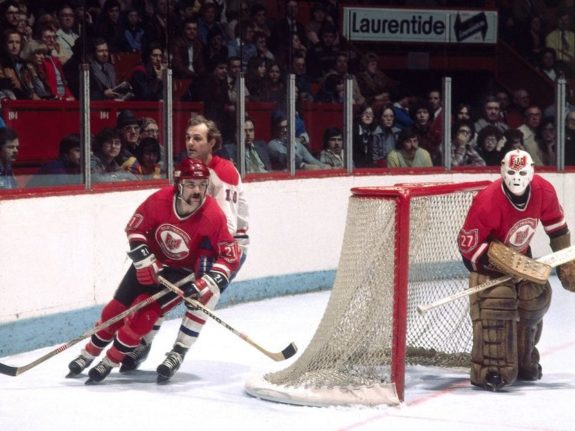
Though they did have some relatively minor successes during their time, the Barons tenure in the league was certainly brief. Not garnering the local support they needed to be viable, the team was in danger of folding. With the intent of keeping such a demise from taking shape the NHL permitted a merger between the Barons and the Minnesota North Stars. While Minnesota assimilated a sizable number of Cleveland’s players, the Barons as a franchise ceased to exist.
Due to the fact that they did not last for very long, the Cleveland Barons took part in only a single NHL Entry Draft as their namesake. To further explain, when the 1976 Draft took place the team had not yet relocated and was still the Seals. Likewise, when the 1978 Draft was held in Montreal, Quebec, Canada on Jun. 15, permission had already been granted for the Barons and North Stars to merge, so essentially the Cleveland team no longer existed.
THW looks back on the Barons’ selections of the 1977 NHL Amateur Draft – the only draft that they ever took part in. When we delve into each of Cleveland’s selections, it will be another indicator as to why the team came and went so quickly.
Mike Crombeen (First Round, 5th Overall)
Mike Crombeen ended up being the Barons’ first overall selection of that year’s draft, and he was highly touted. So much so, that he was selected fifth overall by Cleveland but also chosen fourth overall in the WHA Draft the same year by the Edmonton Oilers. Crombeen opted to go the route of the NHL, and did so after four solid years of junior hockey with the Kingston Canadiens in the former Ontario Hockey Association (OHA) – today’s OHL. His finest season with Kingston was his second year (1974-75) when he scored 56 goals and 58 assists for 114 points in all of 69 games. Crombeen would follow that year up with two more seasons of at least 40 goals, including scoring 42 in only 49 games for 1976-77 OHA season.
Of the nine players drafted by the Barons in 1997, Crombeen had the longest NHL career and played the most amount of games with Cleveland. They would immediately try to capitalize upon his talents by inserting him into the lineup for the first game of the 1977-78 season – a 2-0 loss to the Los Angeles Kings on Oct. 12, 1977. Crombeen would play 47 more games for the Barons that year, while also splitting time with minor league affiliates the Broome Dusters (AHL) and the Salt Lake Golden Eagles (CHL) during the months of January and February 1978. In 48 games with the Barons he would score just three goals and four assists. Crombeen’s first NHL goal was scored in his fourth game – Oct. 20 against the Minnesota North Stars and goalie Paul Harrison.
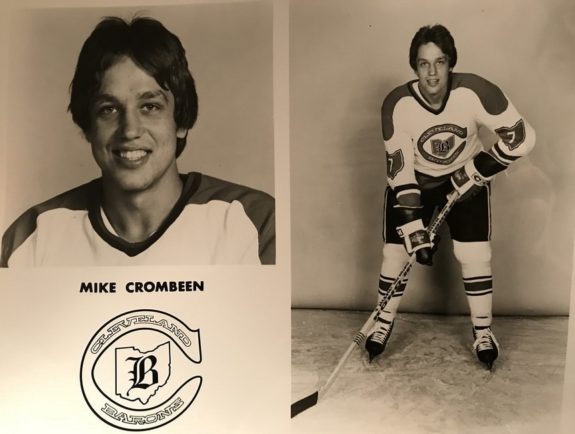
When the 1977-78 NHL season came to a close and the Barons fate was known, the St. Louis Blues claimed Crombeen in the Cleveland-Minnesota Dispersal Draft as the teams were merged. He would remain with the Blues for five seasons and would have the longest stop of his professional career. The finest season of Crombeen’s time in the NHL was 1981-82 when he scored 19 goals and eight assists in 71 games for the Blues. He would finish his career with two seasons as a member of the Hartford Whalers.
Oddly enough Crombeen’s son B.J. played in the NHL for 445 games between the Dallas Stars, Blues, Tampa Bay Lightning and Arizona Coyotes – exactly 30 less career games than his father played. What makes the Barons selection of the elder Crombeen so tough to swallow in retrospect was that he was selected ahead of players who went onto be longtime, successful NHLers including Doug Wilson, Ron Duguay, Ric Seiling, Mike Bossy, Rod Langway, Lucien DeBlois, Mark Napier, John Anderson, John Tonelli and many more.
Dan Chicoine (Second Round, 23rd Overall)
Dan Chicoine played all of six games for the Barons. The month of November was when he was given the chance to crack the 1977-78 lineup. Chicoine played his first NHL game on Nov. 5, 1977 against the Detroit Red Wings. It was a home-and-home series, as the two teams faced each other the very next day in Cleveland. Chicoine recorded a shot on goal in each game. The Barons would win 4-3 in Detroit, but would lose at home 4-1. His final game as a Baron came on Nov. 20, 1977 against the Colorado Rockies.
Chicoine would play parts of two more NHL seasons afterward. One lone game with the North Stars during the 1978-79 season, followed by his longest cup of coffee in the league, the 1979-80 season. Chicoine played in 24 games for Minnesota that year, and scored his one and only NHL goal. Coming Jan. 23, 1980 – in only his second appearance of the season – he slipped one past Michel Dion of the Quebec Nordiques.
The other interesting thing to note about Chicoine’s selection by the Barons was the level of separation at which he was selected professionally. Like Crombeen and many others chosen in the 1977 Draft, he was also selected by a WHA team. The difference being that while the Barons took him early in the second round at 23rd overall, the WHA’s Quebec Nordiques did not pick Chicoine until the ninth round as the 81st pick that year.
Reg Kerr (Third Round, 41st Overall)
Like Crombeen, Reg Kerr was immediately inserted into the Barons lineup for their first game of the 1977-78 season and he immediately sought to make a name for himself. At 5:27 of the opening period, Kerr took on none other than the Kings’ Dave “The Hammer” Schultz in a fight. Fisticuffs would remain commonplace throughout the Barons’ rookie’s career. His time with Cleveland however was remarkably and surprisingly brief.
Playing his junior career with the Kamloops Chiefs of the former Western Canada Hockey League (WCHL) – now today’s WHL – Kerr likely could have been drafted higher than the third round. He was always tough and physical, putting together seasons of 87, 147, and 172 penalty minutes in his three years of junior. Aside from his physicality though, Kerr was also a scorer. In his final year of junior (1976-77) he put forth 47 goals and 54 assists for 101 points in 72 games.
After only seven games with the Barons his rookie season, Kerr was traded to the Chicago Blackhawks in exchange for fellow tough guy Randy Holt. Four years Kerr’s senior, ending up in Cleveland allowed Holt to get his fullest chunk of time in the NHL until that point and serve as the Barons’ enforcer. In just 48 games he compiled a whopping 229 penalty minutes after the trade.
As questionable as it may have been to have parted with a rookie so early, the move ended up being even better for Kerr. After arriving in Chicago, he would play four full seasons in “The Windy City” and became one of the more popular players on the team. His finest NHL season came during the 1980-81 campaign when he scored 30 goals and 30 assists for the Blackhawks and finished the year as a plus-10.
The final stop of Kerr’s career ended up being three games with the Edmonton Oilers during the 1983-84 season. Of all the players that the Barons drafted, his 30-goal season for Chicago was the finest individual performance assembled by any of the draftees.
Guy Lash (Third Round, 42nd Overall)
Winger Guy Lash ended up being a perennial minor leaguer. Although he was selected in the third round by Cleveland as well as the ninth round by the Edmonton Oilers, he never played a game in either the NHL or the WHA. A native of Winnipeg, Manitoba, Canada, Lash played his junior hockey in the WCHL like Kerr did. First playing for the Winnipeg Clubs, followed by the Winnipeg Monarchs, he had decent junior seasons of 68 points, 100 points and 88 points.
Where Lash may have had his best professional hockey performance was with the 1980-81 Wichita Wind of the former Central Hockey League (CHL). With the late Garney “Ace” Bailey coaching at the helm, the team was a collection of NHL veterans as well as future household names for the Edmonton Oilers. Lash’s teammates that year included the likes of Andy Moog, Charlie Huddy, Walt Poddubny, Ron Low, and Dave Semenko. The Wind would make it all the way to the CHL championship that year, but would lose in a hard fought seven games to the Salt Lake Golden Eagles.
To his credit, Lash played in 26 regular season games for the Wind that year, scoring 16 goals and nine assists to be nearly a point-per-game player. He continued his strong play into the playoffs with five goals in eight postseason games.
John Baby (Fourth Round, 59th Overall)
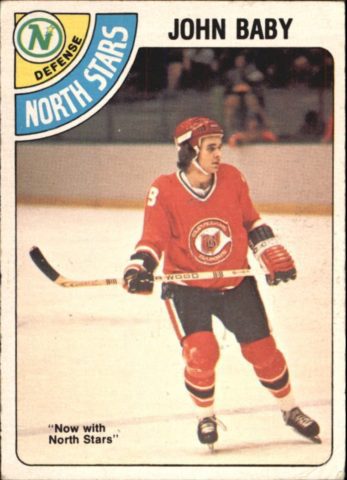
John Baby’s adjustment into the NHL was very similar to Crombeen’s. In fact, of the Barons’ draft selections the offensive-defenseman played the second most amount of games for Cleveland after Crombeen’s 48. Baby was very good at moving the puck and creating offense from the back end throughout his junior career. Likely he should have been drafted higher than 59th, and may have had a longer career were he selected by a stronger team where he did not have the pressure of being a poor man’s Brad Park.
Beginning his OHA career with the Kitchener Rangers, he ended up being moved to the Sudbury Wolves very early on in the 1975-76 season. That year he scored 16 goals and 34 assists in 64 games, while also adding up 155 penalty minutes. Baby’s finest year of junior was his last when he scored 32 goals and 61 assists for 93 points in 63 games for Sudbury.
In his first NHL season he played in 24 games for the Barons. Baby started the year in Cleveland and played there for most of October and one game in November of 1977. After that he played in the minors for the Broome Dusters and Phoenix Roadrunners (IHL). Baby would end up being called back up to Cleveland in early March and finished out the year with the Barons. He scored his first NHL goal on Mar. 8, 1978 against the New York Rangers and goalie John Davidson – it was the Barons only goal of the game in a 6-1 loss. Baby would score his second and final NHL goal two games later in a 2-2 tie with the Colorado Rockies.
Baby played two games during the 1978-79 season for the North Stars to end his NHL tenure. He finished his career with two goals and eight assists in 26 NHL games. Interestingly enough, when the NHL expanded for the 1979-80 season with four former WHA teams merging into the league, Baby was claimed in the expansion draft by the Quebec Nordiques. However he never played a game for them, finishing out his career with three years in the minors.
Owen Lloyd (Fifth Round, 77th Overall)
Defenseman Owen Lloyd was another Barons’ draft choice who was also selected by a WHA team. However, in his case he ended up playing a few games in the rival league with the team who drafted him. While Cleveland drafted Lloyd 77th overall, the WHA’s Edmonton Oilers also drafted him in the 10th round as the 85th overall selection.
Oddly enough, he also ended up playing as a teammate of Lash’s on that same 1980-81 Wichita team. Lloyd compiled 187 penalty minutes for the Wind that year, and played in 16 of their 18 playoff games. Although he would have a few other stops as well, he would remain with the team for two more years. That would make Lloyd one of just a handful of players to have played with the Wind in each of their three years of existence.
The final year of the Wind (1982-83) would be Lloyd’s final year of pro hockey, at least for a decade. He would make a very brief return to professional hockey while in his mid-30s when he and a number of other veteran players suited up for the San Diego Surf of the Pacific Southwest Hockey League for the 1992-93 season.
Jeff Allan (Sixth Round, 95th Overall)
Jeff Allan is the only other player from the Barons’ 1977 draft class to have played any games with the team. Both Cleveland and the WHA’s Cincinnati Stingers selected the 6-foot-2, 200-pound defenseman that year. A native of Toronto who played junior hockey in both the OHA and the QMJHL, Allan had a rather tumultuous first year in professional hockey. He would play for five different teams in five different leagues all in the 1977-78 season alone.
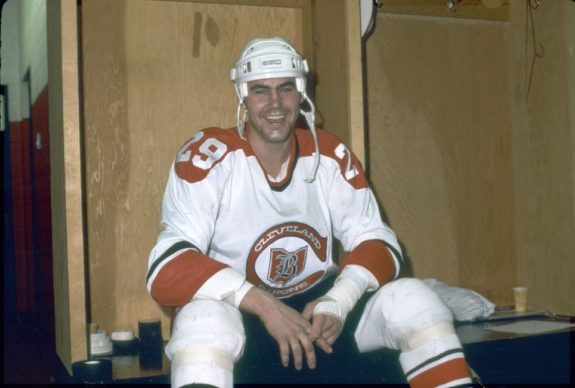
He was also one of the few players to have suited up for both the NHL and the WHA teams that had drafted him. Allan played a mere two games with Cincinnati during his first year. He would have stops with the Phoenix Roadrunners (CHL), Hampton Gulls (AHL), and Toledo Goaldiggers (IHL) that same year too (more on Toledo shortly). As far as the Barons are concerned though, he would be inserted into the lineup at the end of the season just as Crombeen and Baby were. Allan played his first NHL game on Apr. 1, 1978 against the St. Louis Blues. He finished out the Barons season with them, playing in games against the Chicago Blackhawks, Detroit Red Wings, and Pittsburgh Penguins. These would be the only four games of Allan’s NHL career.
Here is where it gets a bit more interesting. Allan played only one more season of professional hockey after that. The 1978-79 season he split between Toledo and the Los Angeles Blades of the Pacific Hockey League. Although he would make a brief showing playing senior league hockey afterward, Allan’s only professional seasons were 1977-78 and 1978-79.
After he finished out his time with the Barons, he would rejoin the Goaldiggers in time for the playoffs. Toledo would make it all the way to the Turner Cup Final where they would defeat the Port Huron Flags in seven incredibly hard-fought games. On a team that included eventual “Miracle on Ice” captain Mike Eruzione, Allan would play in all 17 of the Goaldiggers playoff games to become a Turner Cup champion. So here is a guy that only played two professional seasons as a member of six different teams, and still won a major hockey title.
Mark Toffolo (Seventh Round, 113th Overall)
A native to the suburbs of Buffalo, Mark Toffolo was as tough as they come when it comes to hockey players, and then some. One of a minuscule amount of Americans to play junior hockey in the Quebec Major Junior Hockey League (QMJHL) during the 1970s, he was a feared combatant for his pugilistic skills alone. In his final season of QMJHL play, Toffolo racked up 274 penalty minutes in 62 games during 1976-77.
Recognizing a need for toughness on their roster, the Barons selected Toffolo 113th overall. However, he would not see any action in Cleveland and spent his first professional season playing with four different teams in the IHL. After not being retained by the Barons, Toffolo ended up being drafted in the 1978 NHL Amateur Draft as well and was this time selected in the 11th round by the Washington Capitals.
Never playing at either the NHL or WHA levels, he still played a total of six seasons in the minors for 11 different teams. Toffolo has a rather remarkable distinction, in that he led the entire IHL in penalty minutes during the 1978-79 season while he played for the Saginaw Gears. He compiled a truly jaw-dropping 557 penalty minutes in 78 games that year. Very few professional players ever exceeded such a gigantic number in one season.
Grant Eakin (Eight Round, 128th Overall)
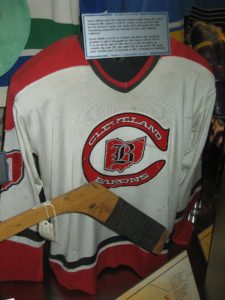
Left-winger Grant Eakin was the final Cleveland Barons draft selection in team history. Another native of Winnipeg, Manitoba, Canada, he actually played parts of five seasons of junior hockey in the WCHL. His final three were as a member of the Lethbridge Broncos and he scored at least 25 goals in each of those years.
For the 1976-77 WCHL season, Eakin produced 40 goals and 39 assists for 79 points in 71 games, while also putting up 179 penalty minutes. With those types of numbers, the Barons could conceivably have had a steal on their hands by taking him so late in the game. When it came down to it though, Eakin played just nine games with Cleveland’s CHL affiliated Roadrunners. He would make a return to Lethbridge to play his final year of junior hockey. Having a later birthday, he was still young enough to play in the WCHL.
The remainder of Eakin’s playing career was also brief. He would play three more seasons of professional hockey, primarily in the IHL. His final season was with the Kalamazoo Wings, whom he had joined after coming over from the Saginaw Gears at the beginning of the 1980-81 season. The Wings would lose in the final of the Turner Cup championship to Saginaw no less. From there, Eakin called it a career.
* originally published in July 2018
